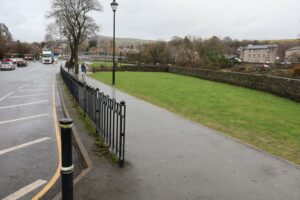Support us from £3/month
We deal with almost 1000 cases a year assisting communities, groups and individuals in protecting their local spaces and paths in all parts of England and Wales. Can you help us by joining as a member?
The Open Spaces Society and Friends of the Lake District have deplored the decision of a planning inspector to allow flood-defence works on New Road Common in the heart of Kendal in Cumbria (now Westmorland and Furness).

Photograph of New Road Common by Ian Brodie.
The application, made by the Environment Agency, followed hard on the heels of a damaging application for neighbouring Gooseholme Common, which was permitted in March 2023. The New Road application was for a linear flood-defence wall, three floodgates and a pedestrian gate, surface-water drainage, and the reprofiling of the slipway to the River Kent. There are also temporary works comprising safety hoarding along the full length of the common.
Because the works were on common land they needed the consent of the environment secretary under section 38 of the Commons Act 2006.
The Open Spaces Society, Friends of the Lake District, and Kendal Civic Society objected to the application because the works would damage the riverside common, and make public access more difficult. The common is currently enjoyed by the public for informal recreation and is an important landscape feature of historic value.
In granting consent on behalf of the environment secretary, the inspector Claire Tregembo (who authorised the works on Gooseholme Common) recognised that the ‘proposed wall would have an adverse effect on the open character of the common. … Although I consider the proposed works would have an adverse effect on the landscape, I do not consider the impact to be substantial over the longer term,’ she said. The objectors considered that the proposed works would alter the feel and experience of the common, making it enclosed. The inspector did not consider this to be significant.
We also argued that the works were against the spirit of the scheme of management, made under the Commons Act 1899 and approved by order on 8 March 1910. This states that ‘the council shall do nothing that may otherwise vary or alter the natural features or aspect of the common or interfere with free access to every part thereof’. However, the inspector had not seen the scheme and said that ‘without it I can only give limited consideration or weight to this view’.
The Open Spaces Society and Friends of the Lake District argued that, in view of the scale and the intrusive nature of the works, the Environment Agency should have offered land in exchange for that to be taken, under section 16 of the Commons Act 2006. It has done this on common land elsewhere in Kendal. However, the inspector rejected this proposal, as she did at Gooseholme.
She concluded that ‘the public benefits of the work, both socially and economically, would outweigh any impact on public access, the neighbourhood, nature conservation, the landscape, and archaeological or historic features.’
Commenting on the decision, our spokesman Ian Brodie said: ‘We deeply regret the further significant erosion of open green spaces adjacent to the river. While we understand the consideration of flood remediation schemes for Kendal, there are other ways of dealing with the defences without such a great and intrusive impact on people who want to enjoy the riverbank.
‘The way the inspector dealt with our legitimate concerns appears dismissive and rewards inappropriate stewardship of Kendal’s open spaces by our local councils.’
